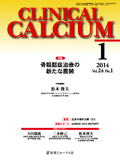Japanese
English
- 有料閲覧
- Abstract 文献概要
- 1ページ目 Look Inside
- 参考文献 Reference
骨粗鬆症および骨粗鬆症を原因とする脆弱性骨折は,我が国においても増加の一途をたどっている。近年,骨吸収を担う破骨細胞に極めて重要な役割を果たすRANKL(receptor activator of NF-κB ligand)をターゲットとした,完全ヒト型抗RANKLモノクローナル抗体デノスマブ(denosumab)が新たな作用機序を有する骨吸収抑制薬として開発され,閉経後骨粗鬆症に対する複数の大規模臨床試験から,ビスホスホネートに代表される既存の骨吸収抑制薬と比較し同程度かそれを上回る骨密度増加と椎体・非椎体の骨折予防効果が示されてきている。一方,デノスマブ投与後の注意すべき有害事象として,低カルシウム血症や顎骨壊死などの発症機序についてはまだ詳細が判明していない点もあり,今後の更なる基礎的・臨床的研究による知見の集積が期待される。
Osteoporosis and osteoporosis-related fractures tend to increase year by year around the world including Japan. Denosumab, a fully human monoclonal antibody to receptor activator of NF-κB ligand(RANKL),a cytokine member of the TNF family essential for osteoclast differentiation has recently been approved in Japan, Europe and the US for the treatment of postomenopausal osteoporosis as well as bone metastasis. In some large clinical trials, denosumab significantly decreased bone resorption, increased bone mineral density(BMD),and reduced the risk of vertebral, nonvertebral and hip fractures in postmenopausal women. However, the mechanism of adverse events of denosumab, such as hypocalcemia and osteonecrosis of the jaws, has not been completely explained. Therefore, further knowledge should be accumulated by additional basic researches and clinical studies on denosumab.



